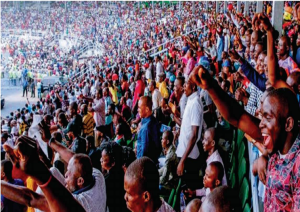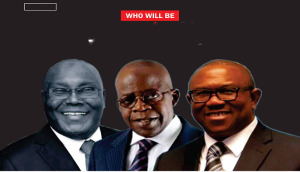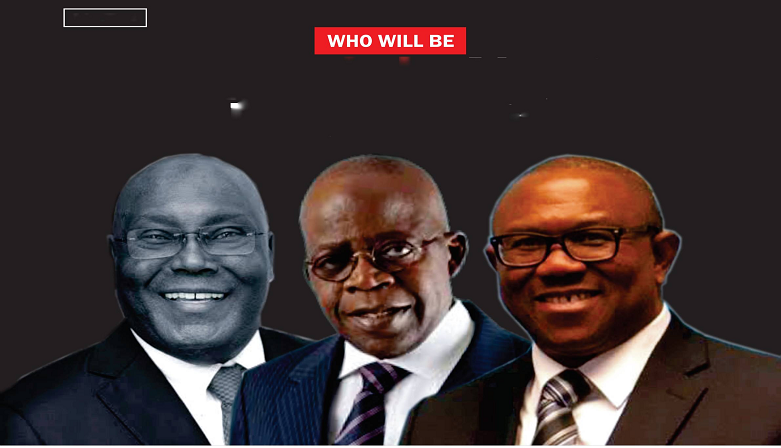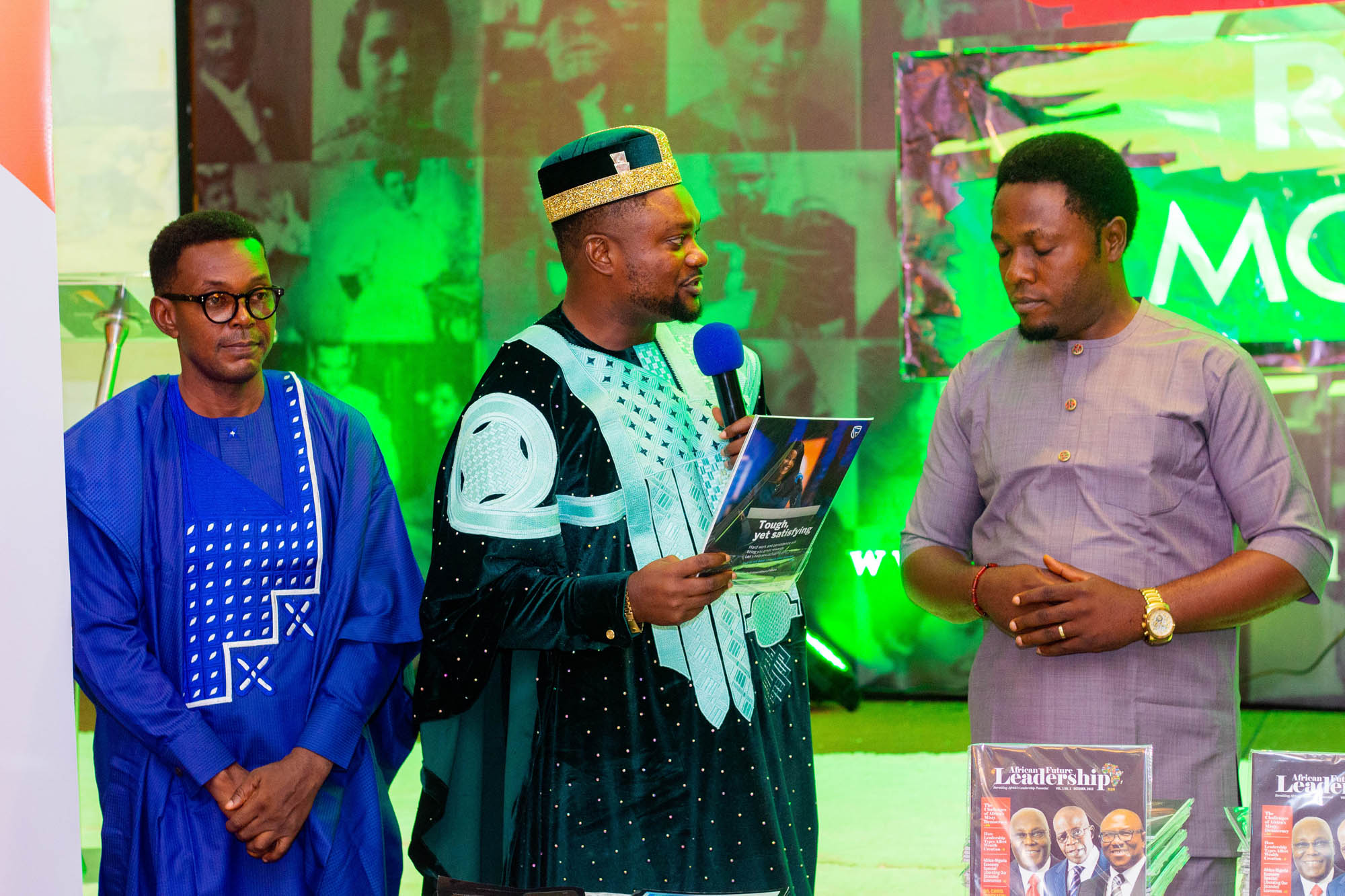Knowing the antecedents of Nigeria’s political history, one cannot but ponder over the dynamics that have always played out in the Nigerian political space. The tendencies, it must be pointed out with a sense of lucidity, has invariably been intense and unpredictable. So, what could we expect at this instance of Nigeria’s sensitive political dispensation? We can only hazard guesses at the very best, while adopting, a more or less, wait and see disposition, hoping that all things being equal, the best leader will emerge in Nigeria.
Some of Nigeria’s past leaders include:
Sir Abubakar Tafawa Balewa, Dr. Nnamdi Benjamin Azikiwe, Maj-Gen J. Aguiyi Ironsi, General Yakubu Gowon: 1957-19661960-196615 Jan-29 July 1966 29 Jul, 1966 -29 Jul 1975
General Murtala Muhammad, General Olusegun Obasanjo, Alhaji Shehu Shagari, Maj-Gen Muhammadu Buhari: 29 Jul 1975 -13 Feb 1976.13 Feb, 1975 – 30 Sept 19791 Oct 1979-31 Dec 1983.31 Dec 1983-27 Aug 1985.
General Ibrahim Babangida, Chief Ernest Shonekan, General Sani Abacha, Gen Abdulsalami Abubakar: 27 Aug 1985 – 27 Aug 1993. Aug 27 1993 – Nov 17 1993.17 Nov 1998-8 Jun 1998 8 Jun 1998-29 May 1999.Chief Olusegun Obasanjo, Umaru Musa Yar Adua, Dr. Goodluck Jonathan, Gen Muhammadu Buhari: 29 May 1999 – 29 May 2007 29 May 2007 – 5 May 2010 5 May 2010 – 29 May 2015 29 May 2015 – 2023
Hence the question that naturally arises now, is who is going to be Nigeria’s next president?
Is it going to be Bola Tinubu, Atiku Abubakar or Peter Obi?
With a population of over 250 million people today, Nigeria is the most populous black African nation. She got her independence from Britain in 1960.
READ MORE: Countries Leading The Green & Clean Africa Campaign
Since then, she has been on a political roller coaster ride down one of the most amazing scenarios of mixed fortunes and political escapades imaginable: From glorious independence celebrations under the cool gaze of late Queen Elizabeth the 2nd of England, Nigeria almost immediately after, tumbled down into the first valley of bloodshed and military coup detat 1 Then she suddenly burst into great economic fortunes in unfathomable wells of black gold, only to abruptly plunge down into the burning volcano of one of the most horrific secessionist civil wars the world has ever seen. Emerging from that horrific conflagration, the Nigerian people have since been tottering and staggering through a stagnant cesspool of wanton poverty, in the midst of a surrounding mirage of bogus natural wealth. In a seeming circumstance of two perceptibly opposing nations in one treasury and identical geographical space, the country now stands at the precipice of the volcano of the most unfathomable elections in its entire socio-political history.
The Setting in 2023
The extreme regional and political fragmentations now dance out of a priormist of reckless corrupt practices, resource grabbing, usurpation, deprivations, impunity and deep tribal demarcations; all cooking up a permanent living circumstance of vile palpable insecurity and increasingly crushing poverty, in which the people now live, churning and wriggling in pains and uncontrolled anger, blindly threatening mayhem, hoping and praying, all in one breath, while crime and avarice, pandemic chokehold and political mesmerisms of white elephant promises by questionable characters out of the blues and hardly assessable in the hurry of political gymnastics where, in truth, ultimately winners will be winners and losers will certainly be losers, and abracadabra!, a new game will begin to unveil itself in the futile gaze of sustained continued hope for a Better Nigeria.
The Character Setting
The gaze now after party primaries is down to the three faces of three personalities:
1. ATIKU ABUBAKAR

This is a colossus of a man of rare spirit of engagement, determination, focus on the target and with the dollar drive and readiness to go the extra mile to get the baton this time around as his final and only last possible opportunity, after which he will definitely and permanently be out of any possibility of attempting to engage this race for the Nigerian presidency, ever again! This, therefore, for Alhaji Atiku Abubakar must be his last and final pitch for the Nigerian top seat; and it is therefore, practically a DO-OR-DIE AFFAIR!
Atiku Abubakar’s PDP 5-Point Development Agenda
Atiku’s abridged policy document which was summed up to a 5-point development agenda seeks to restore Nigeria’s unity through equality, social justice, and cooperation among various people.
The key points of the Atiku agenda seeks to establish a strong and effective democratic government that will guarantee the safety and security of life and property.
He hopes to build a strong and prosperous economy, creating jobs and wealth as well as lifting millions out of poverty, while promoting a strong and true federal system.
Also, another of its policy agenda would be to improve and strengthen the education system and equip students with all necessary skills “required to be competitive in the new global order which is driven by innovation, science, and technology.”
Atiku believes that with the understanding of the above, the people can hold him accountable if he fails to meet the projections he has termed a social contract.
Details of the manifesto are:
On the Economy
On the economy, Abubakar said, ” Our agenda is guided by three basic principles”
which are encapsulated as:
- re-affirming the criticality of private-sector leadership and greater sector participation in development; while also repositioning the public sector to focus on its core responsibility.
- breaking government monopoly in all infrastructure sectors, including refineries, rail transportation and power transmission.
- commitment towards ensuring that the market will then determine prices, and as a result, “the persistent price distortions occasioned by current interventionist exchange rate management policy shall be eliminated.
With regards to the above, there is a promise on optimizing the fiscal space to general more revenues for development. He projected a fiscal regime that is stable and predictable and can clearly bridge the gap between the national revenue yield and national expenditure. Additionally, some of the fiscal strategies to be will be deployed include, Domestic Reforms to improve IGR, promoting export growth to improve fx earnings, blocking leakages and financing projects through strategic partnerships with private sector.
National Security
On national security, there is the plan to reactivate meaningful registration at birth as a way of reducing crime rate and protect Nigerians.
Accordingly, the next national population census will be conducted of as the basis for further development planning.
And dealing with insurgency shall rely mainly on alternative approach to dispute resolution.
Restructuring
In what looks like an approval of state police, there is the promise to restructure and decentralize security institutions, to deal decisively with terrorism, kidnapping andothercrimes.
There is high optimism that Nigeria will work again through restructuring, promising to work with the National Assembly and all other stakeholders, to initiate the process of genuine and transparent constitutional amendments.
Anti-corruption
On anti-corruption, top on the agenda is the strategy to champion institutional reforms of agencies and further strengthenthem.
2. MR. PETER OBI
This man can be characterized as having become the darling, preferred, only perceptible choice and hope destination of the multitudes of the angered southern youths of Nigeria. For them there is a firm conclusion that there can be nothing at all possible to hope for in any perceptibly Old Man in their country; worst of all, any such man who cannot publicly lay out a convincing project intention plan in public debate or public lecture before them, prior to the 2023 presidential elections is out of contention. They demand in advance proof that these OLD MEN are not all over again out to capture the presidency, with the sole intention of targeting to grab for themselves, yet another opportunity for treasury looting and syphoning of the nation’s reservoirs of wealth, with the sole intention of enriching themselves while abandoning the hopes and aspirations of the teeming youth population and the masses. They demand firm and convincing proof of capacity to provide mass youth employment, economic growth, substantive wealth generation and a better standard of livingforthe Nigerian people. All these they are convinced are already guaranteed them by only Mr. Peter OBI!
Mr. Peter Obi’s Labour Party Manifesto
Titled, ‘Prospects of Transformative Governance In Nigeria’, Mr. Peter Obi, Presidential candidate of Labour Party, unveils his manifesto.
And the instructive manifesto of Mr. Peter Obi reads as follows:
- We will offer a new brand of transformative and purposeful leadership. The overall goal of my administration shall be to streamline governance, make it more responsive, transformative, effective, less transactional, and therefore efficient and cost-effective. * Thinking through 2023 and beyond, we must think seriously about a leadership that is imbued with competence, capacity, credibility and commitment. Accordingly, we will pursue intangible assets of good governance, rule of law, security of lives and properties; we will ensure that we have these assets in place and stress asset optimization. We will strike a strategic balance that allows us to promote and protect national interest, while meeting our ECOWAS obligations.
- We will rebuild Nigeria’s military power, promote economic growth, and enhance its technological prowess with a view to improving Nigeria’s diplomatic influence in sub-regional, regional and global affairs.
- Restoring leadership will require that we reassert proactively, Nigeria’s leadership role in African affairs through constructive engagement, peacekeeping duties, 15
and using existing sub-regional and regional forums as well as bilateral platforms for dialogue on current and emerging challenges. We will continue to enhance our sphere of influence via peacekeeping, and trade and investment initiatives. - We shall ensure that in moving Nigeria forward, no state or community will be left behind. Pursuantto its statutory responsibility to protect, our Government will promote equity in power and resource sharing. The federating units will enjoy discernible autonomy. Resources will also be shared equitably. A higher derivation paid to oil or solid minerals producing states will not be tantamount to other states not receiving federal allocations that should keep them viable. We must transcend the rhetoric that bedevils a robust debate on some of these national questions.
- We will respect the principles of federal character, affirmative action and gender balance; but no longer at the expense of merit.
- We will tweak the security architecture, which will entail reform of the security sector and governance. We will Restructure, Re-equip and Reorient the Nigerian Police: This will include 3 level policing- Federal, state and community.
- We will build a Compact, Robust and Ready Mobile Police Force with Rapid Response Deployment capabilities; and Legislate the Establishment of State Police based on Community policing. We will raise the population to police officer ratio to a higher level.
- A properly manned, equipped and technologically driven security system with particular emphasis on re focusing the military on external threats and border protection and police on internal security threats and law enforcement; swift prosecution of criminals, bandits and terrorists; enhanced coordination among security agencies; and upholding the rule of law.
- Integrate the activities of the National Intelligence and Security Agencies by establishing a Central Reporting Intelligence loop under the authority the Minister of National & Homeland Security.
Establish a National Command and Control Coordination Center for the efficient management of actionable intelligence, resource allocation and force deployment. Membership should consist of representatives of all security agencies on a need to know basis. - Oil theft is not petty pilfering. It is organized crime by a syndicate that involves a certain degree of sophisticated intelligence and logistical arrangement. We must admit that oil theft is happening because there is domestic and external collusion. The government and the people have the collective responsibility to protect national assets. On my watch those responsibilities will be accorded high priority.
- Foreign and National Security policy initiatives, might in the long term entail rebuilding, repositioning and sustaining ECOMOG, as the arrowhead of a West African Security partnership. This is to counter terrorist threats and international subversion of the sovereignty of the West African region of which Nigeria must re-establish her place as a regional power.
- We will explore ways of cushioning the forex demands by mainstreaming those components of Diaspora remittances that remain opaque and informal.
- We are challenged by high youth unemployment, which stands at 33.3%; 54%forthe youth; and 20 million out-of school-children. We must give this country back to the Nigerian youths. Half of our 200 million people are below the age of 30.
- *Harnessing our national youth strength and demographic dividends intelligently, must start with curbing the high youth unemployment and creating funding access to enable our youths become entrepreneurs and drivers of our Small and Medium Scale enterprises (SMEs).
- We will have zero tolerance for corruption; block leakages and cut the cost of governance. Our total commitment to transparency and accountability in government business is the only credible way to achieve limited to zero corruption.
- We will enforce the legal framework protecting foreign investors and their indigenous partners. This is the only way to tamper monopoly and capital flight.
- As governor of Anambra State, my administration achieved close to a 60-40 gender balance in appointive and elective positions. The national target has hovered around 30-35%. We intend to progressively aim for between 35-40%, with aggressive gender mainstreaming action plan and rigid benchmarks.
- As part of our monetary policy, we will seek to re establish the independence of the CBN; and commit to a credible and transparent plan to normalize the exchange rate and bring inflation to single digits. We will remove import and forex restrictions and insist on a single forex market. The current system penalizes exporters who bring in forex by forcing them to sell at a rate that they are unable to source for forex when they need to purchase forex. This multiple exchange rate regime encourages capital flight and deters investment, which has further worsened Nigeria’s forex situation.
My top priorities on getting into office:
– Production-centered growth for food security and export.
-Securing and Uniting Nigeria.
– Effective legal and institutional reforms (rule of law, corruption and government effectiveness).
– Leapfrogging Nigeria from oil to the Fourth Industrial Revolution (4IR).
– Expanding physical infrastructure through market- driven reforms (unleashing growth-enabling entrepreneurship and market-creating innovations).
– Human capital development that empowers competitiveness; and Robust foreign policy that restores Nigeria’s strategic relevance.
- We are spending more on recurrent expenses. And we are borrowing frivolously. I am not against loans per se; but we must stop borrowing for consumption. All loans must be invested in regenerative projects. We must operate within available resources and strive for a balanced national budget as cost saving measures. Ending the leakages including the subsidy regime and improving our tax regime should do the magic.
- Lack of political will and lack of synergy between the Executive and Legislative arms has resulted in a costly inertia in tackling our oversized government. The result is persisting turf fights and competition among several overlapping agencies, and the resultant wastages. Cost cutting measures must start with rationalization and harmonization. Pruning the size of government will be imperative.
3. MR. BOLA AHMEDTINUBU
This erstwhile governor of the economic capital of Nigeria, the forever prosperous Lagos State, emerging Mega City of the Nigerian economy, is a proven warrior of yet unsurpassed cunning in the gymnastics of the Nigerian political space. This branded Old Man is seemingly the worst suspected threat to the target desire of the angry southern youth of Nigeria to be assured the reservation of the top seat of the Nigerian nation, for their preferred vibrant, youthful, darling candidate.
In the 2023 presidential elections, there is obviously only one man to beat, and that man is Bola Ahmed Tinubu, popularly referred to as the Jagaban. For Mr. Tinubu also, this is the very last possible pitch for the top post of the Nigerian Nation, though being also his very first attempt in spite of his decades invested singularly in the politics of Nigeria.
Ahmed Bola Tinubu’s APC Party Manifesto
Foisted on the slogan of Renewed Hope, 2023, the Presidential candidate of the All Progressives Congress (APC), Bola Ahmed Tinubu, along with the Vice Presidential candidate, Kashim Shettima say in regard to their rather abridged and summarised party manifesto as follows: Standing on the foundation emplaced by the current APC administration, we shall:
– Build a Nigeria, especially for our youth, where sufficient jobs with decent wages create a better life.
– Manufacture, create, and invent more of the goods and services we require. Nigeria shall be known as a nation of creators, not just consumers.
– Export more and import less, strengthening both the naira and our way of life.
– Continue assisting our ever toiling farmers, though enlightened agricultural policy that promotes productivity, and assures descent incomes, so that farmers can support their families and feed the nation.
– Modernise and expand public infrastructure so that the rest of the economy can grow at an optimal rate,
– Embolden and support our young people and women by harnessing emerging sectors such as the digital economy, entertainment and culture, tourism and others to build the Nigeria economy of tomorrow, today.
– Train and give economic opportunity to the poorest and most vulnerable among us. We seek a Nigeria where no parent is compelled to send a child to bed hungry, worried whether tomorrow shall bring food.
– Generate, transmit and distribute sufficient, affordable electricity to give our people the requisite power to enlighten their lives, their homes, and their very dreams. – Make basic healthcare, education, and housing accessible and affordable for all.
– And most importantly, establish a bold and assertive policy that will create the strong yet adaptive national security architecture and action to obliterate terror, kidnapping, banditry, and all other forms of violent extremism from the face of our nation.
Specifically the Tinubu presidential candidature promises the following:
National Security

Concerning National Security there will be effort to mobilise the entire national security, military and law enforcement assets to protect all Nigerians.
This will involve fighting terror, banditry, kidnapping and violent agitations.
Among others there also the promise to redefine military doctrine and practice and this will touch on upgrading weapons systems, improving salaries and welfare of military and security personnel and others.
In the manifesto, there is plan to reposition the police and do international collaboration.
Economy
• The APC presidential candidate said there will be adjustment of allocation of revenue between the federal and state governments to give states greater flexibility.
• Improve existing industries
• Build economy that produce more of everyday items, both agricultural and manufactured goods.
• Review federal budgetary methodology
• Stop the country’s reliance on imported goods. Importation of non-essential products will be discouraged through policy measures including luxury taxes, higher tariffs, and higher processing fees.
• Tax reform – with review of the corporate tax 17
system and deployment of technology and effective policies to better rationalise the system.
Agriculture
•Tinubu said the action plan includes access to finance for agriculture.
The governance and structure of the Bank of Agriculture (BoA) will be reformed to enable the bank fulfil the core mandate to provide farmers with access to low-cost loans.
• Encourage large-scale land clearing by developing plan to open uncultivated land to both small and large-scale farming and vertically integrated agri-business.
• Farm Cooperatives-to encourage local farmers to form voluntary cooperatives, for them to be able to pool resources together to be able to buy or lease modern farming equipment, tools and fertiliser.
Power
• Eliminate Estimated Billing: by making sure that all electricity bills are meter-based.
•Generation and Transmission Targets.
• Make sure that more of the power the country is already generating can be transmitted and distributed to Nigerian homes and businesses.
• Support for Domestic Manufacturing of Electricity Meters
• Power Sector Governance Reform – by working with National Assembly to review the Electric Power Sector Reform Act 2005 and reform the regulatory and governance structure of the country and others.
Education
•Provide quality Education for all.
•Teacher Training – introduce new accreditation requirements for teachers for federally funded primary and secondary schools.
• Restructure Tertiary Institutions
•Student Loan – introduce pilot student loan regimes
•Provide Special Education Fund.
Healthcare
• Health Financing and National Health Insurance-this is for the purpose of increasing and ensuring more effective health spending.
• Mental Health and Drug Abuse-train primary healthcare workers on need for early detection and treatment of mental illness and drug abuse.
•Care for Healthcare Workers and Job Creation.
The presidential candidate of the APC ends with an attestation that: Governing Nigeria is a sacred trust I do not take lightly. I shall give it my best.
In democratic politics there is only one voice at the end of the Tunnel of Contest and that is the Ballot Box! No more dispensing of words is called for. When The Ballot Box Eventually Speaks, Let There Be Silence And Respect For That Voice. That is what a Democracy is all about and NIGERA SHOULD BE ADEMOCRACY!




